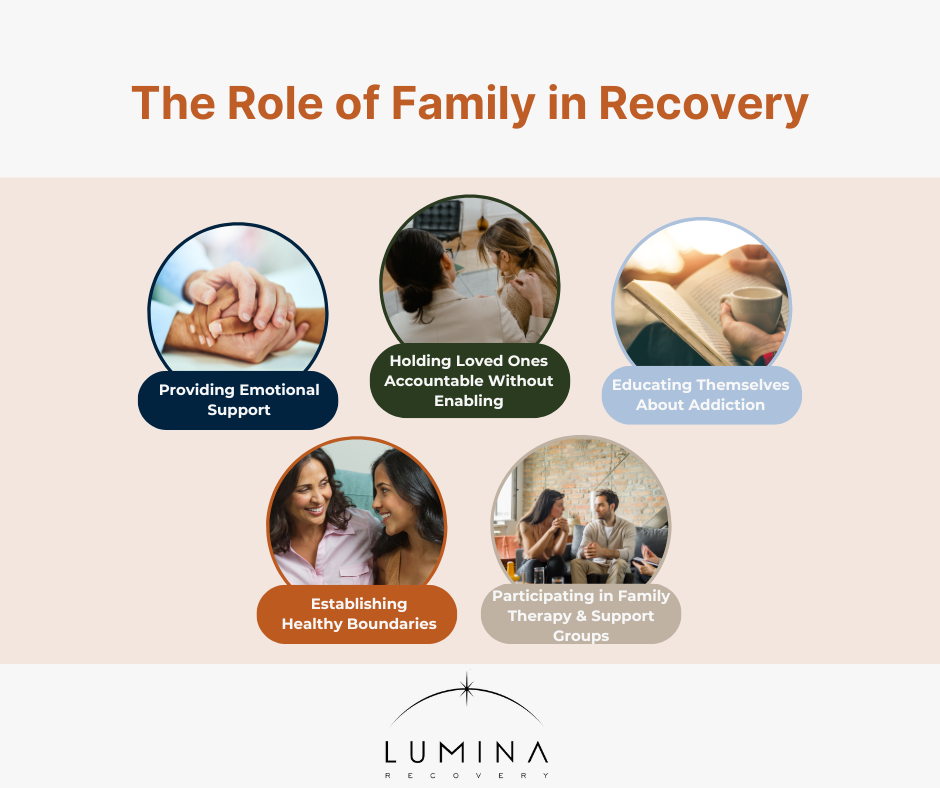Addiction is a disease that doesn’t just affect the person struggling with substance use—it ripples through families, impacting relationships, emotional well-being, and financial stability.
While professional treatment is crucial for recovery, family support plays an equally vital role in ensuring long-term success. Family support for addiction provides emotional encouragement, fosters accountability, and helps create a stable environment for lasting recovery.
How Addiction Affects Families
Addiction doesn’t just impact the individual using substances, but the entire family unit. Understanding these effects can help families navigate the challenges that come with supporting a loved one in recovery.
Emotional, Financial, and Psychological Impact
When a loved one struggles with addiction, family members often experience overwhelming emotions such as fear, frustration, guilt, and helplessness. The unpredictability of addiction can lead to chronic stress, anxiety, and even depression among family members.
Financial stress is also common, as money may be spent on legal fees, medical bills, or attempts to cover debts incurred due to substance use.
Common Family Dynamics in Addiction
Families often develop unhealthy patterns when dealing with addiction. Some of the most common include:
- Codependency – One or more family members may become overly responsible for the addicted person’s needs, neglecting their own well-being.
- Enabling – Family members may unintentionally support the addiction by providing money, shelter, or covering up consequences.
- Estrangement – Some families, overwhelmed by the chaos, may distance themselves entirely.
Impact on Future Generations
Addiction can have long-term consequences that extend across generations. Children raised in households with addiction face a higher risk of substance use disorders, as their environment greatly influences addiction.
Additionally, they may struggle with emotional regulation, forming healthy relationships, or managing stress effectively. Providing proper family addiction support is essential in breaking these cycles and fostering a healthier environment for future generations.
The Role of Family in Recovery
Families are an essential pillar in an individual’s recovery process. Their support, understanding, and involvement can make a significant difference in long-term sobriety.
1. Providing Emotional Support
One of the most important ways families can support a loved one in recovery is by offering emotional stability. Encouragement, patience, and positive reinforcement foster a sense of belonging and self-worth. Family and recovery are deeply interconnected, as a strong support system can determine long-term success or setbacks.
2. Holding Loved Ones Accountable Without Enabling
Support does not mean shielding a loved one from the consequences. Setting clear expectations and encouraging personal responsibility can promote sustainable recovery. Practical ways to enforce accountability include:
- Encourage attendance at therapy and support meetings.
- Refuse to cover up mistakes or provide financial bailouts.
- Set and stick to consequences for substance use.
3. Educating Themselves About Addiction
When families take the time to learn about addiction, they can better understand what their loved one is going through. Education helps to remove stigma and allows families to approach recovery with more compassion.
- Books About Recovery: Beyond Addiction by Jeffrey Foote, The Recovery Book by Al J. Mooney
- Podcasts About Recovery: Recovery Happy Hour, The Addicted Mind
4. Establishing Healthy Boundaries
Boundaries protect both the recovering individual and their family members. Without them, family members may inadvertently enable harmful behaviors or neglect their own well-being. Examples of healthy boundaries include:
- No drug or alcohol use in the home.
- Not engaging in arguments when a loved one is under the influence.
- Prioritizing personal mental health and self-care.
5. Participating in Family Therapy and Support Groups
Support groups and family therapy can help repair relationships and improve overall communication. These programs provide tools to help families navigate recovery challenges and maintain a strong support system.
Support groups such as Al-Anon, Nar-Anon, and SMART Recovery Family provide families with tools to cope effectively and understand how to support an addict in recovery.
Practical Ways Families Can Support a Loved One in Recovery
Support extends beyond emotional encouragement—families can take practical steps to help their loved one maintain a sober lifestyle.
- Encouraging healthy routines. Exercise, nutrition, and hobbies can aid in emotional stability.
- Assisting with job searches. Helping a loved one find a low-stress career can help boost their confidence and purpose.
- Supporting aftercare plans. Attending meetings together, providing transportation, and engaging in recovery follow-ups strengthen commitment.
- Creating a substance-free home environment. A supportive atmosphere significantly reduces triggers and cravings.
- Actively listening and communicating. Open communication helps build trust and ensures the recovering individual feels valued and understood.
4 Common Challenges Families Face and How to Overcome Them
Families supporting a loved one in recovery often face their own set of challenges. Here are some common struggles and ways to manage them.
1. Rebuilding Trust
Recovery is a process, and trust takes time. Open communication, consistent actions, and patience can help restore broken relationships. It’s essential for both the recovering person and their family to work together in fostering an environment of honesty and accountability.
2. Managing Expectations
Recovery is not linear. Families should understand that setbacks may happen and be prepared to support their loved ones without enabling destructive behaviors.
3. Handling Relapse
Relapse is a common part of recovery, but it doesn’t mean failure. Families should:
- Avoid blame and focus on solutions.
- Encourage re-engagement in treatment.
- Seek professional guidance if needed.
4. Balancing Support With Self-Care
Supporting a loved one should not come at the cost of personal well-being. Seeking therapy, joining support groups, and setting boundaries are essential self-care strategies. Family support in addiction recovery must be balanced with maintaining personal mental health.
FAQs
How important is family support in recovery?
Family support is critical in addiction recovery. It provides emotional stability, accountability, and encouragement, which can significantly reduce the risk of relapse and improve overall recovery outcomes.
Why is family important in the healing process?
Family plays a key role in healing by offering love, understanding, and a safe environment. When families engage in therapy and education, they can better support their loved one’s long-term sobriety.
Why is it important to involve the family in the treatment process?
Involving the family in treatment fosters better communication, reduces misunderstandings, and strengthens relationships. Family participation also improves treatment outcomes by ensuring that loved ones provide the right kind of support.
Strengthen Recovery Through Family Unity at Lumina Recovery
Family support plays an indispensable role in the journey of addiction recovery. It’s about striking a balance between caring involvement and healthy boundaries. As families navigate this challenging path, their support can become a powerful force in making the road to recovery less daunting and more hopeful.
Lumina Recovery offers family therapy sessions at our treatment centers to help you and your loved ones get the support they need.
Contact us today to learn more about the resources we have to support your recovery.




